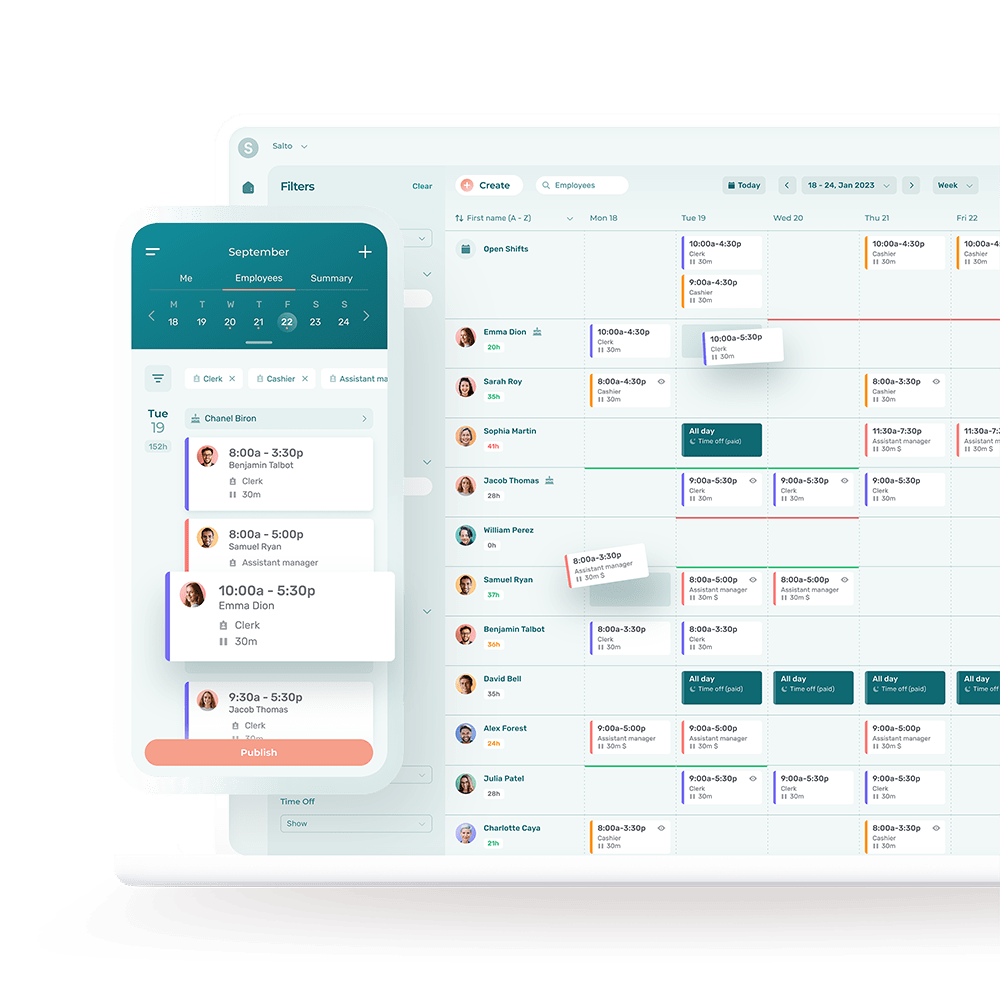A phone interview is often the very first contact you will have with your future employees. You need to be thoroughly prepared in order to make a positive impression!
A phone interview is a call between a candidate and a potential employer, and often takes place in the early stages of a company’s recruitment process—i.e., screening.
Many organizations are using phone interviews nowadays to enhance their recruitment process and sort incoming applications more quickly.
Whether you’re a seasoned recruiter or brand new to management, this guide is sure to provide valuable insights to help you conduct useful and effective phone interviews.
In this post, we’ll cover:
- Why phone interviews are useful
- How to prepare for and conduct a phone interview
- What signals to listen for during the call
- What questions to ask candidates
Why Do a Phone Interview?
Phone interviews allow recruiters to call candidates with interesting qualifications in order to check and see if they fit with their company culture.
As a recruiter, you should also try to find out if the candidate is likely to get along well with their future work team and bring complementary skills or knowledge to the table.
You also need to make sure they meet key requirements such as availability, desired number of work hours, or, for example, having a valid driver’s licence, if these criteria are essential to the position.
A phone interview is often more relaxed than an in-person interview since it is only the pre-screening stage. Candidates are often less stressed.
A phone interview enables you to be proactive and quickly get in touch with candidates.
In a labor-shortage market, it is vitally important to contact the candidates that interest you without delay. Candidates with promising profiles usually don’t have to look for a job very long.
The biggest advantage of a phone interview is that it reduces the number of interviews you will have to conduct in person or by video call. It saves you time (and money) in your recruitment process.
Phone interviews are effective for industries with higher employee turnover rates, such as food service, retail and tourism.
💡Some scheduling software, such as Agendrix, shows you the time slots where you need staff, at a glance. You can also download reports to get a better overview of your labor needs so you can better plan your recruitment process.
How to Prepare for and Conduct a Phone Interview?
A phone interview is not as in-depth as a job interview—but it still requires some preparation on your part.
There are generally 3 stages.
1. Preparation
Draw up a list of questions you want to ask candidates during the phone interview. Use more general questions that can apply to all candidates.
You can also get inspired by phone interview guides available online to create your own.
Then, when you receive an interesting resume, tweak your interview questionnaire with specific questions for the candidate. Avoid asking questions that they already answered in their application form. After all, you’re asking them to fill out this document for a reason!
Don’t forget to contact candidates by email to find out when would be a good time to call. Otherwise, you risk catching them off guard and they may not be at their best.
Also, be prepared to conduct interviews outside of normal business hours to accommodate candidates who are still working for another employer.
True story
I once got a call from a potential employer who hadn’t made an appointment with me beforehand. It had to be one of the worst interviews I’ve ever had in my life.
I was caught completely off guard. I was unprepared for the conversation and unable to give satisfactory answers. It was a very brief call. 😅
In retrospect, I should have just asked the recruiter to call me back at another time. But in the heat of the moment, I decided to play the part of the candidate who’s always ready for anything. In any case, this approach is best avoided if you want candidates to feel comfortable and keep a positive impression of your recruitment process.
2. The Phone Interview
The phone interview should last 15-30 minutes at most. It is first and foremost a conversation to get to know the candidate better. So, avoid bombarding them with questions and focus on listening instead.
Settle into a quiet, distraction-free environment so you can give the task your full attention.
At the beginning of the call, briefly introduce yourself and your company in 1 or 2 sentences to put the candidate at ease.
Then ask them questions and let them elaborate. Also, don’t forget to cover more personal subjects so you can find out a little bit more about their professional background and personality.
Try to take a real interest in their answers. If you do several interviews in a row, it’s easy to start feeling like a robot. 🤖 Try to avoid scheduling multiple consecutive calls, so that you will be 100% present for each interview.
💡 Feel free to take notes, and try to speak clearly. Mind your delivery and tone of voice!
3. Follow-up
If a candidate seems promising, immediately after the call, don’t hesitate to suggest a face-to-face or video interview. Today’s job market is often competitive, so you need to be proactive.
Always inform candidates of the next steps and let them know when they should hear back from you. Don’t make them wait too long, interview interesting candidates as soon as possible.
Always take the time to email candidates you interviewed, even if it’s to tell them you won’t be pursuing the recruitment process with them any further. This way, they will have a more positive mental association with your company.
Who knows—maybe one day they will apply for a different position and they’ll have exactly the right profile.
Signals to Listen for During the Call
During the interview, pay attention to the candidates’ answers, tone and attitude. Try to grasp more than the words they’re saying—do they sound motivated and interested in the company? Do their profile and personality seem like a fit for your company culture?
Remember that there’s no such thing as a perfect candidate. Instead, try to identify candidates who are curious, have a drive to learn, and want to expand their knowledge. At this stage, focus on soft skills; you will have a chance to assess candidates’ hard skills later in your recruitment process.
Red Flags
Be on the lookout for red flags—i.e., indications that a candidate may not be the right person for the job. 🚩🚩
A few examples
If the candidate sounds bored or unenthusiastic about what you’re saying, it doesn’t bode well.
If they seem very distracted and aren’t really listening to you, they may not really care about the call. So it might be best to pursue recruitment with more interested and motivated candidates. Alternatively, you can offer to call them back at a more convenient time.
If a candidate seems to have nothing but negative comments about all of their former employers, this is a huge red flag. The candidate may have had negative experiences in the past, but they should be able to calmly and reasonably explain why.
Be sure to trust your instincts; if you aren’t connecting, if the candidate’s answers are vague, or if they’re unable to answer your questions, it may be best to move on to other more promising candidates.
What Are Some Examples of Questions to Ask In a Phone Interview?
To help you better structure your telephone interviews, here are the best questions to ask candidates.
Questions About the Company
These questions help us get a sense of candidates’ motivation. If they have done their homework on the company and seem to have a good grasp of what you do, it’s a very good sign!
- What about the job offer sparked your interest?
- Why would you like to work for our company?
- Have you ever been a customer of ours?
- How did you hear about the company?
Questions About Work Experience
These questions will help you determine if the candidate will be able to perform their tasks effectively and thrive in their new job.
- Why are you looking for a new job?
- Why did you leave your last job?
- What did you like most about your previous jobs?
- What would you have changed in your previous jobs?
- What skills have you developed or updated recently?
- Why do you think you have the skills for the job?
Questions About the Person
These questions allow candidates to tell you a bit more about themselves. You will also be better able to assess whether their profile matches what you’re looking for.
- Describe an achievement you’re proud of.
- What management style do you prefer in a boss?
- What motivates you in your work life?
- What are your passions?
- Can you tell me a bit about your professional background?
Questions About the Position
These questions will allow you to determine whether the candidate meets your requirements for the position you’re looking to fill.
- What are your salary expectations?
- What benefits are essential to you?
- Do you have any questions about the position?
- When can you start?
- Are you available to work evenings and weekends?
Become a Pro at Recruitment
If this is your first time doing a phone interview, don’t hesitate to practice with a colleague. One thing is for sure—you now have all you need to be thoroughly prepared and make your recruitment process a positive experience for everyone.
We wish you all the best in optimizing your management processes… and finding your new recruit as soon as possible!










